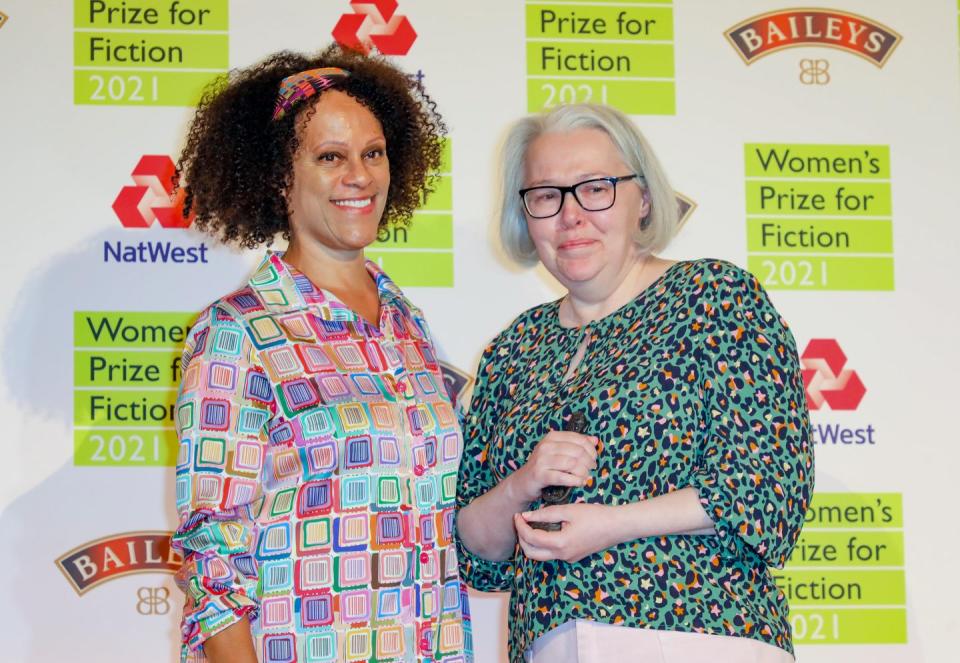Susanna Clarke on writing Piranesi; the 2021 Women's Prize for Fiction winner

Sixteen years ago the extraordinary, ferociously unique novel, Jonathan Strange & Mr Norrell, catapulted Susanna Clarke to literary stardom. The 44-year-old debut novelist (then working as an editor of cookbooks) was expected to produce a sterling, somewhat immediate, follow up, but it would be 2020 before we would receive one. The result, Piranesi, was worth the wait. This month, it was awarded the Women's Prize for Fiction 2021.
"I'm honestly still in shock," Clarke tells me, and her humility is in no way forced. After her name was announced, the entire gathered crowd could feel her utter, unabashed amazement.
"Oh when Bernardine Evaristo started talking about who had won, I sort of thought - wait - is that Piranesi? When I realised, I almost grabbed Patricia Lockwood by the arm, and shook her, I just felt so excited! But I thought it's probably not best to start off by assaulting another author on the shortlist, so I managed to restrain myself."

Her win means so much because Piranesi was a novel she never thought she would finish. The gap between her first and second novel was caused by illness. Clarke suffers from chronic fatigue, a debilitating condition that has hampered her writing process for nearly two decades. In her acceptance speech, she dedicated her award to anyone who suffers from a similar ailment and thinks they will never recover enough to fulfil a dream.
"It felt like such a personal book as it felt like such an achievement to have even attempted it," she says. "I wish I could go back in time and tell the person was who was ill: 'Don't worry, you will be able to write something.' Because it can be so isolating and bleak, and you're not sure that the future holds anything. You can see a future stretching ahead of you, but is there anything in it? It was a big encouragement for me when I heard stories of people who who'd managed to achieve something in spite of it, so I hope what I have been able to do with this book goes some way to encourage others too."
Piranesi is a curiously unique and tricky novel to define. The narrator is ambiguous, the setting is vast and mysterious, its meanings multi-faceted. Clarke enjoys learning of the many interpretations of the novel from its readers and critics; its fantastical elements have wrought many allegorical readings, many of which have surprised her.
"Very often they find things in it that I didn't necessarily think I put there," she chuckles. "But I feel strongly that you when you're writing, you're trying to connect with something that's quite like a dream. I wanted to create something I hadn't been seen before, but which, at the same time, felt a bit familiar - like deja vu."
Clarke's idea, of writing from our shared subconsciousness, adds to the eerie, magical nature of her books, both of which have been credited with elevating the fantasy genre to critically-lauded literary fare.
"What we now call fantasy books, are really incarnations of the earliest types of storytelling," she explains. "It is a very pure form, one in which you can build worlds and in which metaphors can be made manifest. There is a lot of freedom in these kinds of tales."
"They are also my favourite stories, because they provide a true escape," she continues, listing The Chronicles of Narnia among her most treasured reads. "When my brother died very suddenly, in 2000, I bought a copy of The Amber Spyglass by Philip Pullman. I would read for hours and hours and hours and hours. I cannot actually remember a single thing about that book, but I know that it absorbed me totally and got me through such a difficult time. While I was reading, I had a respite from grief."
I ask her if writing fantasy worlds provides her the same sort of peace, and she nods earnestly. "You can't experience the story the way the reader experiences it, but you can be in that world, and in those moments of flow, your illness is completely irrelevant," she says. "That's a huge thing. Writing takes you away from illness for a while. It gives you a purpose."
For now, Clarke hopes to build upon the momentum of Piranesi and produce a much yearned for third novel.
"I'm honestly not sure I was ready for this when I was younger," she says. "Plus, I think there's no reason why people can't write and tell stories in later life. Stories are for all ages, aren't they? Children tell stories and old people tell stories and everybody in-between does. They are for all of us."
Piranesi, by Susanna Clarke is out now. Find out more about The Women's Prize for fiction here.
You Might Also Like

